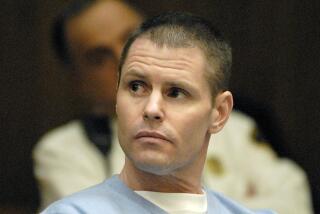‘Whitey’ Bulger sentenced to life in prison
BOSTON — It’s been decades since Boston mobster James “Whitey” Bulger helped murder 11 people and terrorize countless others, but his actions finally caught up to him Thursday: A federal judge sentenced him to two consecutive life terms plus five years, all but guaranteeing he will spend the rest of his life in prison.
After reading a lengthy rebuke of Bulger, 84, and the names of the 11 people he was convicted of killing, U.S. District Judge Denise J. Casper imposed the sentence and ordered him to pay $19.5 million in restitution to the victims’ families.
“The scope, the callousness, the depravity of your crimes are almost unfathomable,” Casper told the expressionless Bulger, dressed in a bright orange jail jumpsuit. “The testimony of human suffering that you and your associates inflicted on others was at times agonizing to hear and painful to watch.”
Many in Boston hope this is the last they hear of Bulger, whose name returned to the news in 2011 after he had spent 16 years on the run. He was captured in Santa Monica, his apartment walls stuffed with hundreds of thousands of dollars.
“The myth, the legend, the saga of James Bulger is now finally over,” U.S. Atty. Carmen Ortiz said outside the courthouse.
Bulger’s lawyers vowed to appeal, calling on the government to investigate who in law enforcement worked with Bulger and had not been brought to justice. Bulger contended that a prosecutor had granted him immunity during his years as a crime boss, but the judge refused to allow that defense.
Many family members said they felt better after the sentencing, particularly because they were able to speak in court about the harm Bulger inflicted.
“There is some closure,” said Tom Donahue, whose father, Michael, was gunned down when giving a neighbor a ride home in 1982. “I’ve been waiting 31 years for someone to get convicted of killing my dad.”
In her statement before the sentence, Casper recounted some of the factors that helped her decide on the length of time Bulger should serve. They included that he was a fugitive for 16 years and that many families had to wait decades to find out what had happened to their loved ones.
“I have also struggled with what would ever be just punishment for the unfathomable harm that you have caused,” Casper said. “And I know that any sentence I impose will be cold comfort for the losses that so many have suffered.”
The “plus five years” portion of the sentence is related to a firearms conviction that carries a mandatory five-year minimum. Bulger was also convicted of racketeering charges.
Bulger’s sentencing follows a day of statements from victims’ families in which many recounted how much they missed their loved ones, and how they remembered the day their father, husband, uncle, friend disappeared.
“I cried for days, I cried for weeks, I cried for months,” Marie Mahoney said at the sentencing hearing Wednesday. Her father vanished in 1973. “How does a 12-year-old come to grips with a parent never coming back?”
Bulger’s lawyers have said he considers the trial a sham because he was not able to present evidence showing the depth of FBI corruption or to argue that he had immunity. Bulger was “pleased that he held to his principles” and didn’t participate in the sentencing portion of trial, said one of his attorneys, J.W. Carney Jr.
Bulger exchanged information with FBI agents including John Connolly, who tipped off Bulger in late 1994 that he was about to be indicted. Bulger fled; Connolly is in prison. Other FBI agents involved, including John Morris, Connolly’s supervisor, were granted immunity from prosecution.
Although Bulger decided not to take the stand or speak at his sentencing, he has been voluble from his jail cell, writing to victims’ families and just about everyone else who sends him correspondence. Carney said Bulger had received “hundreds” of letters and responded to every one.
Casper’s ruling does not prevent Bulger from speaking from prison or selling the rights to his life story, although any proceeds would go to the victims as restitution. It was unclear whether he had any other resources to make restitution. Taxpayers paid $2.6 million for his defense.
Although victims’ families universally detest Bulger, many agree with his lawyers that more information should be released on FBI corruption. Many families also complain about the deals struck between prosecutors and Bulger accomplices, including John Martorano, who admitted to 20 murders but was released from prison in 2007. Other accomplices, including Bulger right-hand man Kevin Weeks, are also out of prison.
“Those people that were involved in the crime are walking the streets today,” said Sandra Patient, whose uncle, Arthur Barrett, was chained to a chair and shot by Bulger. “Any of us could bump into Martorano or Weeks in any corner store, or any street corner. I think it’s ludicrous and wrong.”
Tom Angeli’s father allegedly was slain by Bulger, but the mobster was not convicted of it. Still, Angeli said, “all I wanted was accountability, and I think we got that. The man had a good run, and now he has to pay. It’s almost like a war criminal. He’s going to pay for it now.”
More to Read
Sign up for Essential California
The most important California stories and recommendations in your inbox every morning.
You may occasionally receive promotional content from the Los Angeles Times.











